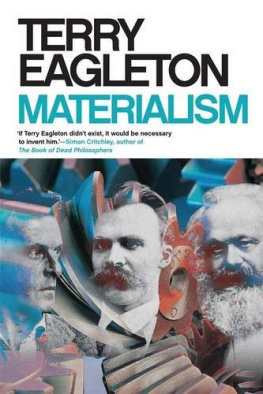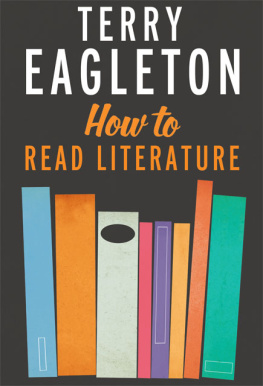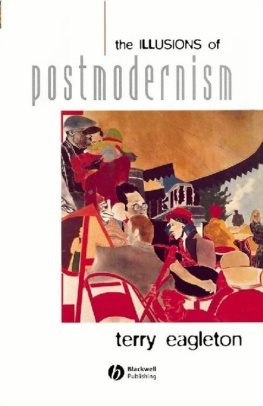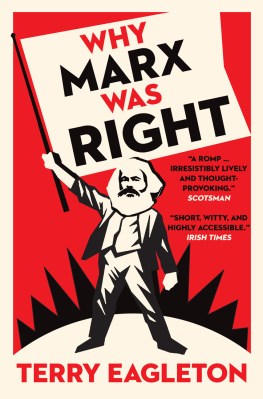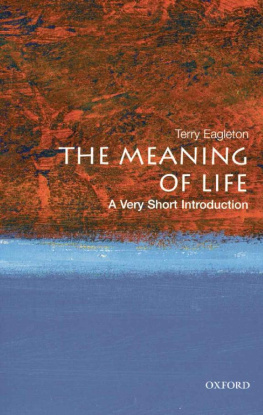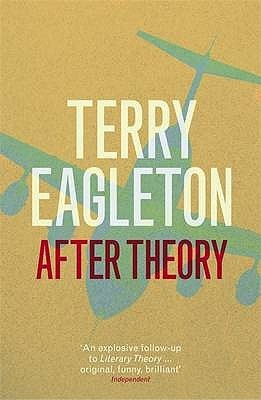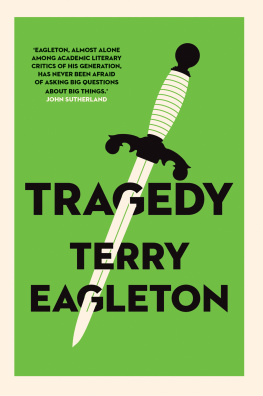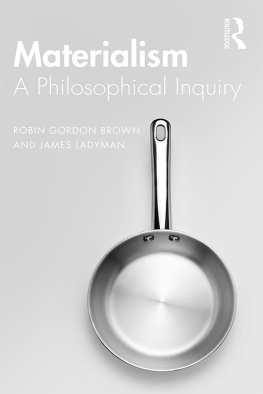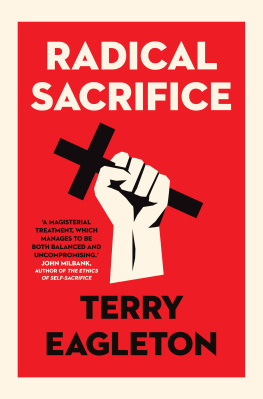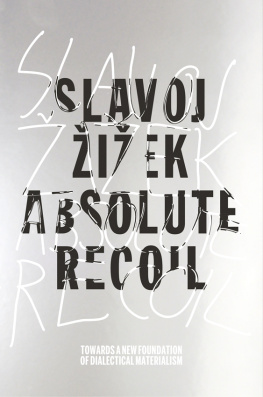Materialism

Copyright 2016 Yale University
All rights reserved. This book may not be reproduced in whole or in part, in any form (beyond that copying permitted by Sections 107 and 108 of the U.S. Copyright Law and except by reviewers for the public press) without written permission from the publishers.
For information about this and other Yale University Press publications, please contact:
U.S. Office:
Europe Office:
Typeset in Adobe Garamond Pro by IDSUK (DataConnection) Ltd
Printed in Great Britain by TJ International Ltd, Padstow, Cornwall
Library of Congress Cataloging-in-Publication Data
Names: Eagleton, Terry, 1943- author.
Title: Materialism / Terry Eagleton.
Description: New Haven : Yale University Press. | Includes bibliographical references.
Identifiers: LCCN 2016025877 | ISBN 9780300218800 (cl : alk. paper)
Subjects: LCSH: Materialism.
Classification: LCC B825 .E24 2017 | DDC 146/.3dc23
LC record available at https://lccn.loc.gov/2016025877
A catalogue record for this book is available from the British Library.
10 9 8 7 6 5 4 3 2 1
In memory of Leo Pyle
Contents
Preface
T HIS IS AMONG other things a book about the body, but not (such, anyway, is my fervent hope) the kind of body that is currently fashionable in cultural studies, and which as a subject of discussion has become narrow, exclusivist and tediously repetitive. There is, then, a polemical subtext to the study, as it seeks to examine modes of human creatureliness which postmodern orthodoxy has largely shoved to the sidelines, and which are among other things true of all human bodies regardless of, say, gender and ethnicity. I trust that this unabashed universalism will prove sufficiently scandalous to the commissars of contemporary cultural discourse.
It would seem that those postgraduate students around the globe these days who are not working on vampires or graphic novels are at work on the body, but in ways that exclude certain productive approaches to it. As usual, those who sing the praises of inclusivity are remarkably ignorant of just how much their own favoured idiom leaves out. Cultural studies is concerned for the most part with the ethnic, gendered, queer, starving, constructed, ageing, bedecked, disabled, cybernetic, bio-political body the body as object of the sexual gaze, locus of pleasure or pain, inscribed with power, discipline or desire. The human body dealt with in this book, by contrast, is of a more rudimentary kind. It is not in the first place a cultural construct. What is said of it applies as much in Cambodia as in Cheltenham, as much to Belgian females as to Sri Lankan males. If it is true of Hillary Clinton, it was equally true of Cicero. Only those postmodern dogmatists for whom, astonishingly, all universal claims are oppressive, with the exception of that particular universal claim, are likely to be scandalised by such an approach.
Cultural studies has produced some valuable insights into the body, but seems to be unaware of its own rather depressing political history in this respect. One of the chief sources of the topic is the work of Michel Foucault, whose writing also marks a crisis of the revolutionary left in the wake of the late 1960s. It was at the point when certain more ambitious forms of radical politics seemed to have faltered, rebuffed by powerful right-wing forces, that historical materialism began to give way to cultural materialism, and an interest in the body started to gather strength. If it served to challenge a leftist politics too cerebrally remote from the senses, it also had a hand in displacing it. Like any fetish, then, this particular body serves to plug a gap. The relation between the body and socialist politics was kept on the political agenda by some pioneering currents of feminism; but by the 1980s talk of socialism was yielding ground to talk of sexuality, and a cultural left that was now for the most part shamefacedly silent on the subject of capitalism was growing increasingly vociferous on the question of corporeality. We shall see later, however, when we come to consider the work of Marx, that the two need not be regarded as alternatives.
I am grateful to the two anonymous readers who commented valuably on an earlier draft of this book, not least to the brutal suggestion by one of them that I cut the first forty pages. In my view, the work has profited greatly from this amputation. Rachael Lonsdale, my editor at Yale University Press, has now steered half a dozen books of mine through the press with a preternaturally keen eye for loose phrasing and structural incoherence. She is the best of editors, and I owe her a deep debt of gratitude.
T.E.
CHAPTER ONE
Materialisms
M ATERIALISM COMES IN various shapes and sizes. There are hard-nosed versions of it as well as soft-bellied ones. Given the daunting size of the subject, however, not to speak of my own intellectual limitations, only some of these currents of materialist thought will be the concern of this book. My interest is not in certain highly technical questions of monism, dualism, eliminativism or the mindbody problem in general, but in forms of materialism that are in some broad sense social or political, and about which the neuroscientists have had for the most part nothing very exciting to say.
If you are the kind of materialist who holds that material conditions set the pace in human affairs, you may seek to change these conditions in the hope that you may thereby alter the way people think and act. If your materialism is of a deterministic kind, one which regards men and women as wholly conditioned by their environments, this project may Politically speaking, this was not an unambiguously progressive project. As Marx would later point out, the alteration in question was generally in the service of the rulers own needs and interests. He was not slow to detect the politics implicit in this theory of knowledge.
There is a link between radicalism and materialism in some of the left-wing thought of the English Civil War, as there is in the work of Baruch Spinoza and the philosophes of the French Enlightenment. It is a legacy that descends to Marx and Engels, and which crops up in our own time in the work of such dissident theorists as Gilles Deleuze. (Darwin, Nietzsche and Freud are also radical materialists, but not thinkers of the far left.) Though the word materialism was coined in the eighteenth century, the doctrine itself is an and one of its earliest exponents, the Greek philosopher Epicurus, was the subject of Marxs doctoral thesis. Marx admired Epicuruss passion for justice and liberty, his distaste for the accumulation of wealth, his enlightened attitude to women and the seriousness with which he took the sensuous nature of humanity, all of which he saw as bound up with his philosophical views. Materialism for Epicurus, as for the Enlightenment, meant among other things freedom from priestcraft and superstition.
For Isaac Newton and his colleagues, matter was brute, inert stuff (stupid, Newton called it) and as such had to be set in motion by the external power of the divine will. The point has a bearing on the human body. Those who look upon the body rather as they regard a corpse are likely to feel the need to add some ghostly entity to it if it is to be galvanised into action. Gross and sluggish as it is, it is hardly likely to activate itself. In this sense, disembodied minds and souls are among other things an attempt to compensate for the crudities of mechanical materialism. If one took a less mechanistic view of matter, they might well prove superfluous. If spirit and Nature are distinct domains, then the former is free to exert its sway over the latter. In the Newtonian view, spiritual forces rule Nature from above rather as monarchs and despots govern their states.
Next page
